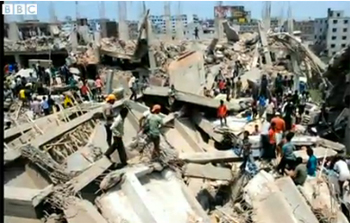Whether it's confusion or denial, apparel retailers have turned in a shameful PR performance in the aftermath of the deadly April 24 factory collapse in Bangladesh that took more than 800 lives.
Benetton doesn't seem to know the details of its supply chain, an inexcusable corporate reality in an industry with years of PR problems related to suppliers. The Italian fashion giant has been a prime example of ham-handed PR since wire photos of garments found in the rubble of the collapse displayed Benetton tags.
After denying any involvement – a blanket statement that any junior account executive knows should be issued only when a company is absolutely sure of its veracity – Benetton waffled to claim a single order and then this week its CEO acknowledged the company bought shirts from a manufacturer, New Wave Company, based in the collapsed plant.
 Of course, he made that disclosure in a maze of distinction. "The New Wave company, at the time of the tragic disaster, was not one of our suppliers, but one of our direct Indian suppliers had subcontracted two orders," Benetton chief Biagio Chiarolanze told the Huffington Post.
Of course, he made that disclosure in a maze of distinction. "The New Wave company, at the time of the tragic disaster, was not one of our suppliers, but one of our direct Indian suppliers had subcontracted two orders," Benetton chief Biagio Chiarolanze told the Huffington Post.
The CEO's admission came a week after the Wall Street Journal contradicted Benetton's earlier assertion and revealed the New Wave tie, citing documents for thousands of units in at least two orders.
Chiarolanze said his company will make funds available to the families of victims in the collapse, citing a "moral obligation" on the garment industry.
There is no mention of the plant collapse on Benetton's media website.
The company did more than $2B in sales last year. This is not the way a fashion heavyweight should behave.
Retailer The Children's Place admitted it used a supplier in the Rana building but added the baffling fact that "none of our apparel was being produced there at the time of the tragedy," as if that matters. The New York Times reported that 120,000 pounds of clothing had been sent in 21 shipments from the Rana factory to TCP, with a two-ton shipment delivered to Georgia on April 5.
The company in a May 1 Facebook posting chastised "certain media reports that have suggested" the company hasn't been clear about using a supplier in the collapsed building, but a quick visit to the retailer's press releases on its website shows nothing about the matter.
The company said in the Facebook post "we have been very clear in all our statements since this tragic event that one of our suppliers was located in the building that collapsed."
Statements? Where?
Retail giant Wal-Mart has also taken a nuanced stance in noting that it didn't have any "authorized production" at the collapsed factory. It made a similar comment after a November factory fire in Bangladesh when its products were found in the rubble.
Wal-Mart, likely still smarting from a New York Times expose in December that said it blocked a push for new safety rules in Bangladesh, is joining with other retailers like Gap Inc. and jcpenney to "reassess" practices in the country.
The top Bangladesh contractor, fashion brand H&M, is due some (minimal) credit for acknowledging the disaster in its corporate press room online, even though, it says, none of its clothes were made at the Rana plant. But the company went off the rails in trying to push all of the blame on the impoverished country where it makes its clothes.
"It is important to remember that this disaster is an infrastructure problem in Bangladesh and not a problem specific to the textile industry," the company audaciously stated, before expressing a willingness to take part in a "joint force" to "influence this issue."
Canadian apparel brand Loblaw and CEO Galen Weston has earned some kudos for the company's response to the tragedy, acknowledging early on that its products were made in the collapsed factory and chastising industry peers for their shoddy response.
He noted at Loblaw's annual meeting April 30 that only two of 30 global apparel brands commented on the disaster in its aftermath and pledged to reform inspections to include structural reviews.
Loblaw, which makes the Joe Fresh clothing brand, and Irish clothier Primark were the only two to take ownership of the crisis in the immediate aftermath, admitting their clothes were made in the Rana Plaza facility.
A factory fire killed 11 more people this week in Dhaka.
Said Loblaw's Weston about his industry: "I'm very troubled. I'm troubled by the deafening silence from other apparel retailers on this."


 Business leaders will face challenges in the upcoming year, some of which will come as a complete surprise, or beyond anyone's imagination.
Business leaders will face challenges in the upcoming year, some of which will come as a complete surprise, or beyond anyone's imagination. Teneo has hired Philipp Grontzki, who is a 20-year veteran of corporate communications and financial journalism, as a managing director in its strategy and communications group.
Teneo has hired Philipp Grontzki, who is a 20-year veteran of corporate communications and financial journalism, as a managing director in its strategy and communications group. Rowan Benecke, who co-founded Zeno Group and helmed Burson-Marsteller's tech practice, has joined McKinsey & Co as director of communications for North America.
Rowan Benecke, who co-founded Zeno Group and helmed Burson-Marsteller's tech practice, has joined McKinsey & Co as director of communications for North America. BCW has named Golin's Matt Coldagelli EVP and leader of its corporate affairs practice in Chicago.
BCW has named Golin's Matt Coldagelli EVP and leader of its corporate affairs practice in Chicago. Abby Bailey, who headed corporate communications for Fedex in its Middle East, India and Africa region, has joined Teneo as managing director in Dubai.
Abby Bailey, who headed corporate communications for Fedex in its Middle East, India and Africa region, has joined Teneo as managing director in Dubai.


 Have a comment? Send it to
Have a comment? Send it to 
No comments have been submitted for this story yet.